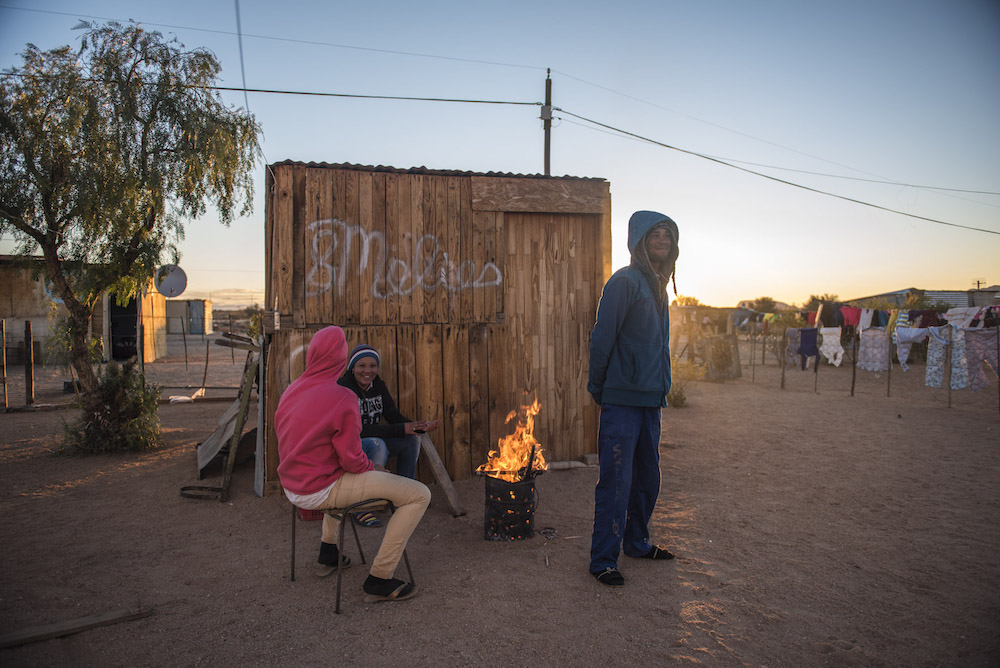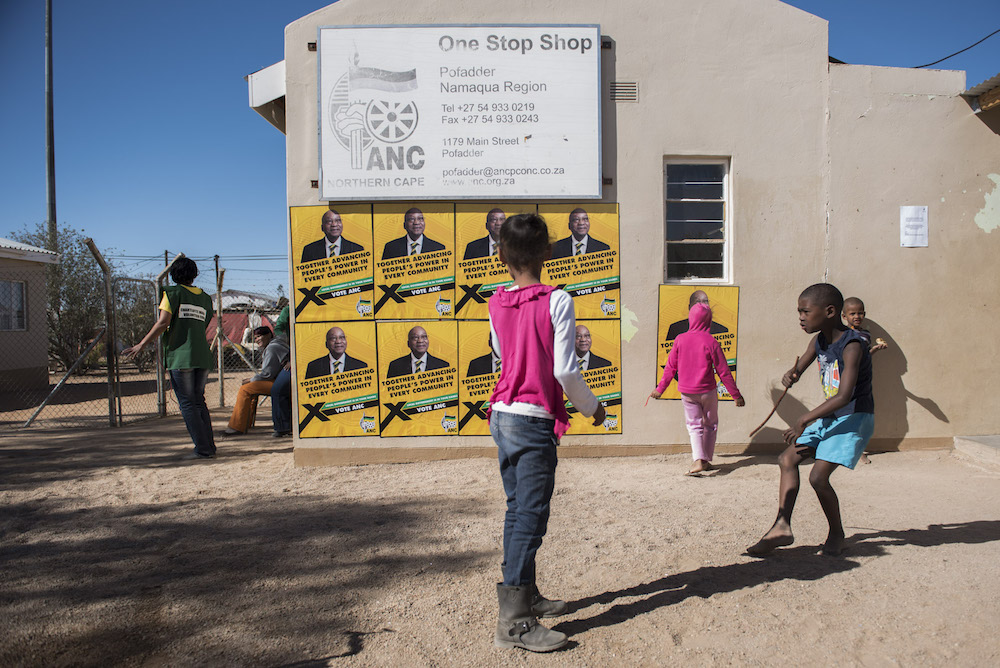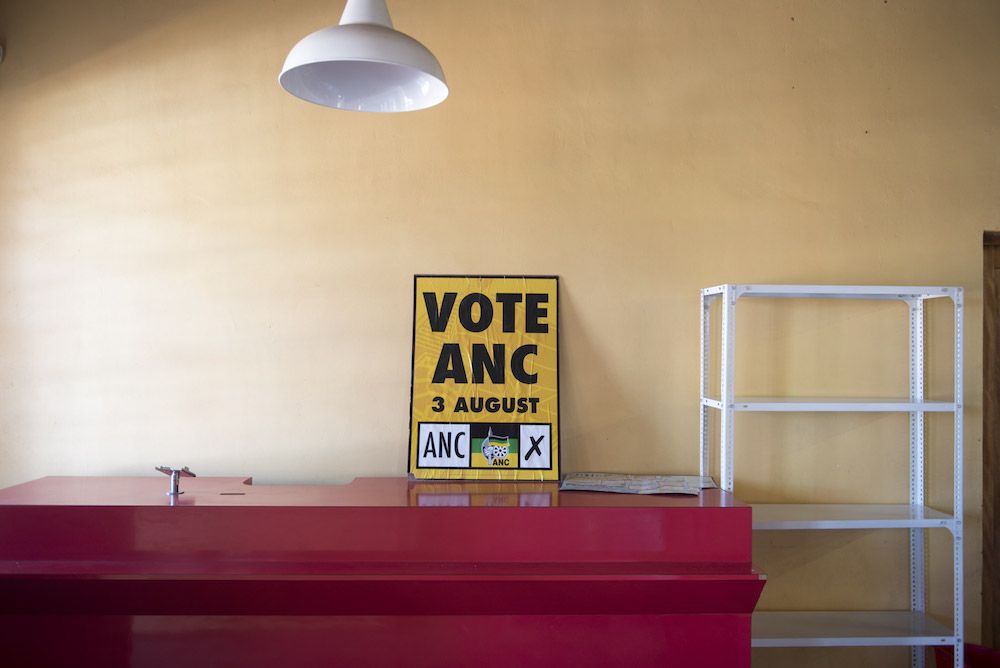Pofadder in election time.
Update: August 4 2016
The ANC maintained its commanding share of the vote in the Khâi-Ma local lunicipality. Provisional results show that the party won 57% of the vote – a slight change from the 58% it took in the last local government elections.
The big change, however, is in the opposition: The DA came second with 24% of the vote, while the Congress of the People (Cope) won 7%. This is a marked changed from the 2011 elections, when Cope got 28% of the vote and the DA 13%.
This continues the national trend of Cope losing out in its share of the vote, with the DA and EFF profiting.
Kicking a rugby ball through two posts should be a simple task for any well-built teenager. But in Pofadder the wind is a problem. Picking up red sand as it blows across the grassless field, it keeps knocking the ball off the cup. Undeterred, he chases the ball down and puts it back on the cup. Each kick takes about five repetitions of this act. But every kick goes over the bar.
In the single cement stand next to the pitch, his peers laugh at his determination. One holds a golf club, but has no balls to hit. They pose for a photo. Jokes and bravado flow from their lips as they act up for the lens.
Then they start talking about the sole public sports ground in Pofadder. Its 2m brick walls create a large space for sports. It is well used. Barbed wire on the walls creates the illusion of a safe space in a volatile community. Graffiti spraypainted on the walls either advocates drug use – tik is king here – or calls on people to be drug-free.
Sport – or a mining scholarship – are the only ways out. Boesmanland High School is the highest level of local education, before people try to get into a technical college 160km away in Springbok.
In the Khâi-Ma Local Municipality – which Pofadder is the centre of – only 18% of those older than 20 have completed matric, according to Statistics South Africa. That makes kicking a rugby ball through two posts a pivotal task for those dreaming of leaving. Any advantage helps. One of the teenagers asks: “Are you putting grass here?”
In this town – so far west that the sun rises nearly an hour later than in central South Africa – the unemployment rate of their generation is officially a third. StatsSA shows that overall unemployment in the four towns that make up the Khâi-Ma municipality has gone from 11% in 2001 to 23% today.
More than 1 000 people are part of the expanded public works programme – its orange overalls are a common piece of clothing. This means one in six people of a working age relies on the R640 a month locals say they get from the programme. Its work gangs spread across Pofadder, sweeping the dirt yards of public buildings and pavements. The rest of the employed work on the surrounding sheep farms or in the town’s few shops.
People put the high unemployment rate – and the reliance on public works for jobs – at the door of the ANC. But this does not translate to damage on election day. The party consistently gets just below two-thirds of the vote in local and national elections.

Brandon (he doesn’t give his surname) has his back to the fire outside his wooden shed, a hand covers the hole in his pants. The most substantial thing about his home is the thick lock and chain keeping it secure.
A biting wind blows across Pofadder, channelled by the mountain ranges to its north, which hide the Orange River, the Namibian border and a new concentrated solar plant. Brandon flexes his shoulders for a photo, but still can’t stop shivering.
“We support the party [ANC] because that is how you get a job.”
His sister picks up a rock and drops it from headheight on a wooden packing crate to break up wood for the fire. Similar sheds dot the area, each with an outside fire and people huddled around it. Poorly insulated and badly built, even the brick homes in the north of Pofadder are too cold to stay inside.
A white VW Golf drives past Brandon’s gate, the ANC’s “a better life for all” posters stuck to its side. The two occupants nod their heads. With a population of just under 4 000, strangers stand out in Pofadder. Especially those who venture from the main N14 highway as it heads from Pretoria to the Atlantic Ocean. It splits the town into the older southern section, with wide streets and homes on big stands, and the northern section with RDP homes squashed together on small stands.
Pofadder’s residents elect people to two of KhâiMa’s four wards. It is one of few municipalities in the country to use a first-past-the-post electoral system, instead of the usual one of proportional representation. This creates a council, currently split into four ANC representatives, two Congress of the People (Cope) representatives and one Democratic Alliance representative.
That council was called to account to the Standing Committee on Public Accounts last year. Several irregularities were cited, including the council not meeting for three years. People in Pofadder say that this effectively stopped any business from happening. The standing committee noted that much of Khâi-Ma’s administrative work had been taken over by its parent body – the Namakwa District Municipality.
Improvements since then – cited by the municipality – are mostly on the surface. Electricity poles line the mostly dirt streets of Blyvooruitzicht – Ward 2 of Pofadder. A few of those streets are tarred, and some are being paved with bricks.

In the ANC’s election pamphlet, it says its provincial leadership has delivered “renewable energy projects and the Square Kilometre Array (the multi radio telescope project), as well as refuse collection and clean water.
Those pamphlets are handed out at the party’s one stop shop, an understated home packed with pamphlets, computers, telephones and stacks of used dishes. More of the pamphlets arrive during the cold, but sunny day, delivered by the eager team driving a South African Communist Party bakkie. The sticker on its door showing its affiliation is no bigger than a postal letter, but the team keep referring to each other as kameraden (comrade).
Each pamphlet drop is accompanied by langarm dancing with the team manning the booming speaker system at the ANC headquarters. The base is out; the treble dominates. Every time someone walks past, a dancer seizes the microphone and exhorts “Viva ANC, Viva!”. Few respond.
One of the less interested passers-by, Klaas Adonis, is in need of someone to share his anger with. “There are no jobs in Pofadder. You don’t have to ask anybody, just look,” he says. A truck driver, he helped supply solar panels to the billionrand industry that has brought some income to these parts.
The KaXu Solar One concentrated solar plant is 30km from where he stands. His was part of the hundreds of temporary jobs this industry brought. He now has no job. Despite his red pants, he intends to vote blue next week: “This, now, is little change. Life never gets better in Pofadder. The Democratic Alliance can do better, maybe.” He is one of Pofadder’s few people to not intersperse his sentences with terms such as poes.
The DA is looking to move into the vacuum created in the Khâi-Ma municipality by the collapse of Cope. In the last local elections, the party came from nowhere to get 28% of the vote, with the DA coming third with 13% of the vote. This changed in the last national election, with the DA gaining Cope’s share. Voting trends in the last two decades show that the ANC nearly always does the same. It is their opposition that comes and goes, from the New National Party to Cope and now the DA.

In Pofadder it seems what the opposition does is immaterial. This is a town – and a municipality – which stays loyal to the governing party. Most of the people in Pofadder say this is not an issue of service delivery (all the trees have rubbish impaled on their thorns because refuse collection is haphazard at best) but one of power and patronage.
“Everyone knows who you voted for so you cannot take a chance voting for another party. You might lose out.”
The speaker is like many others here – they openly speak about life and their difficulties. But they dart their eyes about and lower their voices when talking about the status quo.